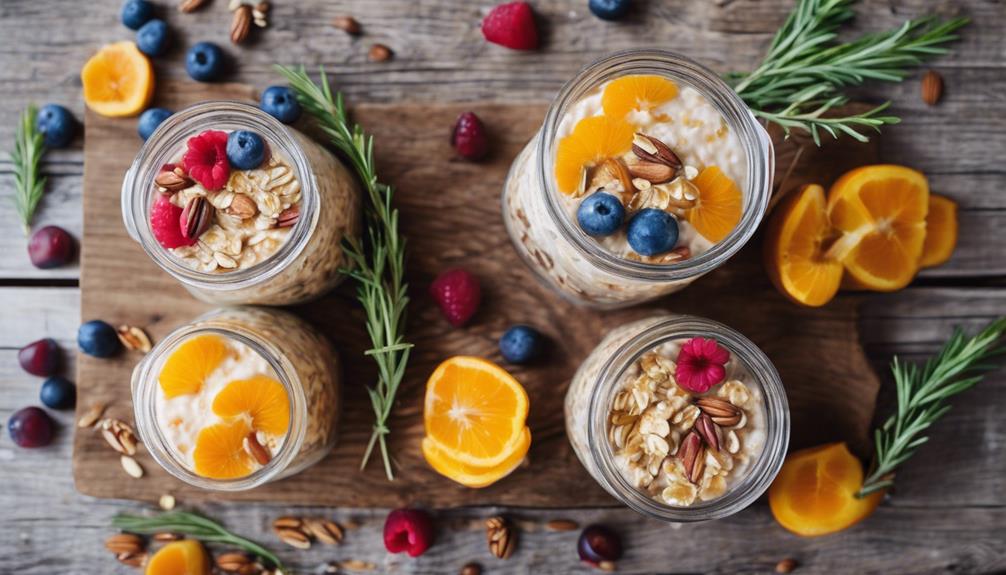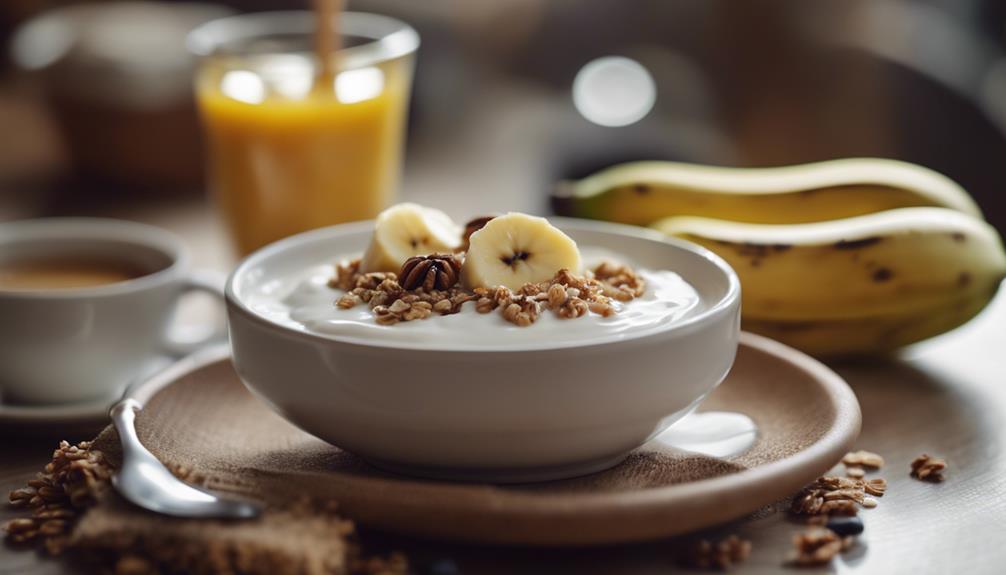You're starting your day off right by incorporating the Mediterranean diet's signature flavors and nutrients into your breakfast routine. Focus on nutrient-dense foods like fresh fruits, whole grains, and healthy fats from olive oil and nuts. Whip up a wholesome omelet or frittata with veggies and feta cheese, or try overnight oats with dates and pine nuts. Pair Greek yogurt with berries and nuts for a protein-packed breakfast. From savory scrambles to hearty quiches, you'll find plenty of delicious and healthy options to get your day started on the right foot – and that's just the beginning of your Mediterranean breakfast journey!
Key Takeaways
- Focus on nutrient-dense foods like whole grains, fruits, and healthy fats for a balanced Mediterranean breakfast.
- Incorporate protein-rich eggs, Greek yogurt, and nuts to support muscle health and satiety.
- Fresh fruits like berries and citrus provide vitamins and antioxidants, perfect for adding to oatmeal or yogurt.
- Whole grains like oats, whole wheat bread, and bulgur aid digestion and regulate blood sugar levels.
Mediterranean Breakfast Essentials
When crafting a Mediterranean breakfast, you'll want to focus on incorporating a few essential ingredients that provide a nutritional foundation for a healthy and satisfying start to your day.
The Mediterranean diet includes a variety of nutrient-dense foods that work together to support overall well-being. You'll want to prioritize healthy fats, like those found in olive oil and nuts, which support heart health and reduce the risk of chronic diseases.
Fresh fruits, such as berries and citrus, add natural sweetness and a boost of vitamins and antioxidants. Whole grains, like oats and whole wheat bread, provide fiber that aids digestion and helps regulate blood sugar levels.
Greek yogurt is another staple in Mediterranean breakfasts, offering high-quality protein that supports muscle health and promotes satiety.
Wholesome Omelets and Frittatas

As you explore the world of Mediterranean breakfasts, you'll find that omelets and frittatas are a delicious and nutritious way to start your day, packed with protein, vitamins, and minerals.
These egg-based meals are incredibly versatile, allowing you to incorporate a variety of vegetables like spinach, tomatoes, and zucchini, which enhances their nutritional profile.
You'll benefit from the high protein content, which aids in muscle repair and promotes satiety, making them an excellent choice for a fulfilling breakfast.
Adding ingredients like feta cheese or herbs can elevate the flavor of omelets and frittatas while contributing beneficial nutrients, such as calcium and antioxidants.
Plus, frittatas can be made ahead of time and stored for quick reheating, making them a convenient option for busy mornings or meal prep.
Serve them alongside whole-grain toast or a fresh salad, and you'll have a balanced meal that aligns perfectly with the Mediterranean diet principles.
With wholesome omelets and frittatas, you can start your day feeling energized and nourished, ready to take on whatever comes next.
Nutritious Overnight Oats Recipes

Now that you've mastered the art of wholesome omelets and frittatas, it's time to explore the world of nutritious overnight oats recipes.
You'll love how easy it is to create fiber-rich overnight options that cater to your taste preferences, and you'll appreciate the customizable morning delights that can be tailored to your dietary needs.
With a few simple ingredients, you can whip up a delicious and healthy breakfast that will keep you going all morning long.
Fiber-Rich Overnight Options
You can kick-start your day with a nutritious and filling breakfast by preparing fiber-rich overnight oats recipes that cater to your taste preferences and dietary needs. These convenient breakfast options can be prepared in advance, allowing you to grab a quick, fiber-rich meal in the morning. Recipes like Date & Pine Nut Overnight Oatmeal and Blueberry-Banana Overnight Oats provide a natural sweetness and are high in fiber, contributing to digestive health.
| Recipe | Benefits |
|---|---|
| Date & Pine Nut Overnight Oatmeal | Natural sweetness, high in fiber, promotes digestive health |
| Blueberry-Banana Overnight Oats | Rich in antioxidants, high in fiber, supports heart health |
| Chia Seed Overnight Oats | Rich in omega-3 fatty acids, high in fiber, promotes satiety |
| Whole Grain Overnight Oats | Low in added sugars, high in complex carbohydrates, supports sustained energy |
Customizable Morning Delights
With countless combinations of fruits, nuts, and spices, overnight oats recipes offer a world of customization to kick-start your morning with a delicious and nutritious breakfast.
As you explore the Mediterranean breakfast scene, you'll find that overnight oats are a staple in many healthy Mediterranean diets. By incorporating customizable ingredients like fruits, seeds, and nut butters, you can create a breakfast that's tailored to your taste preferences and dietary needs.
Here are some ways to take your overnight oats to the next level:
- Add chia seeds to boost omega-3 fatty acids and fiber content, promoting digestive health and satiety.
- Experiment with different fruits and veggies, like figs, blueberries, and bananas, to add natural sweetness and fiber.
With these quick and easy recipes, you can prepare a healthy Mediterranean breakfast in advance, saving time in the morning and setting yourself up for a nutritious start.
Fresh Fruit and Yogurt Combinations

Combining fresh fruit with yogurt creates a nutrient-dense breakfast that not only tantalizes your taste buds but also packs a powerful punch of protein, fiber, and antioxidants to fuel your day.
By choosing Greek yogurt, you'll get a high-protein breakfast option that can contain around 20g of protein per serving, enhancing satiety and muscle health.
When you incorporate a variety of berries, such as strawberries and blueberries, into your yogurt, you'll not only add natural sweetness but also boost your antioxidant intake, contributing to overall health.
Adding nuts and seeds, like almonds or chia seeds, increases the healthy fat content and fiber, which can improve digestive health and promote longer-lasting energy.
Opt for plain yogurt and sweeten it naturally with fruits or a drizzle of honey to reduce sugar intake considerably.
You can customize your yogurt and fruit pairings to your liking, using fresh produce like citrus fruits for a revitalizing twist or mashed bananas for creaminess.
Savory Scrambles and Toasts

As you explore the world of savory scrambles and toasts, you'll discover that combining eggs with fresh herbs and veggies creates a protein-packed breakfast that will keep you going all morning.
You can also experiment with different flavor profiles by adding ingredients like feta cheese, olives, or sun-dried tomatoes to your omelets.
Now, let's take a closer look at the egg-cellent combos and fresh herb flavors that will elevate your Mediterranean breakfast game.
Egg-cellent Combos
You'll crack open a world of flavors and nutrition when you create savory scrambles and toasts that bring together the best of Mediterranean breakfast ingredients.
These egg-cellent combos will become your new go-to breakfast options, packed with protein, vitamins, and minerals to keep you energized throughout the morning.
Some delicious recipes to try include:
- Spinach & Egg Scramble with Raspberries, a balanced breakfast high in vitamins and minerals
- Muffin-Tin Spanakopita Omelets, a convenient, protein-rich choice for busy mornings or meal prep
Fresh Herb Flavors
Fresh herbs like basil, parsley, and dill bring a bright, invigorating twist to your morning routine, instantly elevating the flavor profile of savory scrambles and toasts. By incorporating these fresh herbs into your scrambled eggs, you're not only adding antioxidants and vitamins but also contributing to a healthier breakfast option that supports immune function.
You'll love the creamy texture and rich flavors of herb-infused spreads on toast, like whipped feta with mint or ricotta with chives, which provide protein and healthy fats. In Mediterranean breakfast dishes, using herbs can help reduce the need for excessive salt, promoting heart health by managing sodium intake.
Plus, a sprinkle of fresh herbs on top of your dish doesn't just add flavor; it also enhances visual appeal, making your meals more enticing and enjoyable. This can encourage healthier eating habits, which is exactly what you want to start your day off right.
Hearty Quiches and Tarts

Quiches and tarts take center stage in Mediterranean breakfast cuisine, offering a satisfying blend of flavors and nutrients in each delicious bite. You can indulge in a hearty breakfast without compromising on health, thanks to these versatile dishes. For a low-carb alternative, try making quiches with creative crusts, like spaghetti squash, and load them with nutritious ingredients like tomatoes and feta cheese.
Here are some ways to make quiches and tarts a staple in your Mediterranean breakfast routine:
- Customize your quiches with various vegetables, such as zucchini or bell peppers, to boost their nutritional profile and cater to your personal taste preferences.
- Prepare crustless quiches in advance, like the Spinach and Mushroom variety, for a simple yet healthy breakfast option that's high in protein.
Mediterranean-Inspired Grains

As you explore Mediterranean-inspired grains, you'll discover a world of fiber-rich breakfast options that not only satisfy your hunger but also provide a boost of energy to kick-start your day. Whole grains like bulgur and brown rice are staples in Mediterranean cuisine, known for their nutrient density and ability to lower cholesterol levels.
You can incorporate these grains into your breakfast routine by creating oatmeal or grain bowls, ensuring a balanced meal rich in vitamins and minerals essential for energy.
Take it to the next level by adding Mediterranean flavors with ingredients like olive oil, herbs, and spices. This not only adds taste but also provides additional health benefits.
Using grains as a breakfast base allows for versatility, enabling you to add fruits, nuts, and yogurt for a complete and nutritious meal.
With Mediterranean-inspired grains, you can create healthy breakfast ideas that are both delicious and filling. By incorporating these grains into your morning routine, you'll be well on your way to a healthy and energized start to your day.
Quick and Easy Breakfast Ideas

You can whip up a Mediterranean-inspired breakfast in no time with these quick and easy ideas that will fuel your morning with protein, fiber, and flavor.
Whether you're in a rush or just want a hassle-free breakfast, these recipes will become your new go-to's.
- Whip up a Greek yogurt with honey and walnuts for a high-protein breakfast that'll keep you full until lunch.
- Prepare overnight oats like Blueberry-Banana Overnight Oats the night before for a grab-and-go breakfast packed with fiber and nutrients.
These quick and easy breakfast ideas will provide you with the health benefits you need to start your day off right.
A filling breakfast is essential to keep you energized and focused throughout the morning, and these Mediterranean-inspired recipes are designed to do just that.
Frequently Asked Questions
What Is a Typical Breakfast on a Mediterranean Diet?
You're wondering what a typical breakfast on a Mediterranean diet looks like? It usually features Greek yogurt with fruits and nuts, whole grains like oats or whole wheat bread, and eggs as a protein-packed start to your day.
How to Do the Mediterranean Diet for Beginners?
'You're about to commence a flavorful adventure, transforming your plate into a vibrant Mediterranean haven! To start, focus on incorporating small, achievable changes daily, like adding a serving of fruits or veggies, and gradually build up to a balanced, delicious diet.'
Is Oatmeal Allowed on a Mediterranean Diet?
You're wondering if oatmeal is allowed on a Mediterranean diet; the answer is yes, as it's a whole grain providing fiber and essential nutrients, which aligns with the diet's focus on whole grains and heart health.
What Is a Healthy Breakfast to Kick Start the Day?
You're not just fueling up, you're setting yourself up for success – so ditch the sugary treats and grab a breakfast that balances protein, healthy fats, and complex carbs to power through your morning.
Are Mediterranean Breakfast Ideas Also Suitable for a Healthy Start in the Morning?
Mediterranean breakfast ideas offer a healthy start to the morning with their emphasis on fresh fruits, whole grains, and lean proteins. While they may differ from traditional Dominican breakfast dishes, they can still provide a satisfying and nutritious way to kick off your day with a variety of flavors and nutrients.
Conclusion
You've just released the secret to a morning that's nothing short of amazing!
With these Mediterranean breakfast ideas, you'll be fueling up for a day that's bursting with energy, radiating with liveliness, and overflowing with flavor!
Your taste buds will do the happy dance, your body will thank you, and your mind will be sharp enough to tackle anything that comes your way.
Get ready to take on the day like a rockstar!










